#Symphonic Etudes
Explore tagged Tumblr posts
Text
youtube
Hendrik Andriessen (1892-1981) - Symphonische Etude ·
Netherlands Symphony Orchestra · David Porcelijn
3 notes
·
View notes
Note
So true about Kaiba being a moody dramatic Rachmaninoff piano concerto hoe lmao. Would he give Chopin a pass for ballade in g/winter winds you think, or is anyone who writes frilly little etudes automatically disqualified from the playlists on principle?
Oh god so here's my opinion as someone who played classical piano for eight years and interned at a classical music organization for a while: as the adopted son of a rich man who was (according to DM) invested in cultivating some kind of philanthropic/cultured image, Kaiba was probably dragged along to many, many classical music events as a young lad, and sat there in his penguin suit under strict orders not to fall asleep, fold the program into paper airplanes, fidget too much, or let Mokuba fidget too much. What he truly knows about classical music might fill a bucket (the four major eras, the big name composers, some basic music theory) but not a swimming pool.
Like I don't love seeing "rich people" cliches stuck on Kaiba, because his life story is far more complex than that, but I do think this one--"ultrawealthy donor attends a night at the symphony because it's a good look for them, not because they understand the intricacies of Mahler"--might apply here. He IS going to see Yuja Wang play Prokofiev, but he does not know why/how Prokofiev is important, and unless he took a dedicated interest in music (leading to your exquisite insights) he might just slap KAIBA SYMPHONIC HALL atop the arts center, mail over a check for $20mil, and be done with it Gozaburo style.
That being said, this is my answer to your question: I think he pays attention during a performance of Chopin's Tristesse (or, Ravel's Pavane por une infante défunte?) feels one too many feelings, and wants to go crawl into a dirt hole about them afterwards, like a dying animal. But he has to schmooze at the donor's club, so he can't. He is wearing a cummerbund and a bowtie, and now he is twice as miserable.
When he locks himself in his lab later, to burn the midnight oil, he listens to the Chopin again, in private, and discovers new feelings--which are actually just the old feelings, newly remembered.
Also his favorite symphony is Mahler 5. Look me in the eyes and tell me he wouldn't go ballistic for the trumpet solo.
21 notes
·
View notes
Text
Lapinha's Tombeau: Symphonic Etude No.1, Mov. Vivace for 2 Oboes, 2 Bassoons, Trumpet, Clavichord, Timpani and Strings.
by @suigenerisstuff
youtube
ps. I'm proud to present this original work, there will be three movements in all, so follow for the other two!
Joaquina Maria da Conceição 'Lapinha', probably born in Minas Gerais, was a black musician who lived at the end of the 18th century and the beginning of the 19th century. She was one of the pioneering women to receive authorisation to take part in public shows in Lisbon and the first Brazilian singer to make an international career through the dissemination of the modinha genre in its inaugural adaptations for Latin America. Joaquina Lapinha's anonymity is a reminder that many first-rate black women and artists have been forgotten by history, due to ideologies that are harmful to human dignity and art. The work presented is firstly a tribute to her triumph in life, based on an interpretation of the concert music of the time and the Galante Style, which was largely influenced by elements of the Mannheim School and the Empfindsamkeit genre.
#Youtube#classical music#classical studies#fine art#classic literature#art#music#article#art critique#orchestra#mozart#symphony#classical musician#classical art#composer#beethoven#bach#piano#violin#fineart#vivaldi#baroque#musician#academics#Aesthetic#academia#classic academia#uni#literature#college
5 notes
·
View notes
Text
youtube
Etudes symphoniques (Symphonic Etudes) , Op. 13, Adagio and Allegro brillante: Variation 11 (arr. P.I. Tchaikovsky for orchestra) · Seattle Symphony · Gerard Schwarz
5 notes
·
View notes
Text

Dr. Daniel Bernard Roumain (born May 3, 1971) opera composer, violinist, pedagogic, and activist was born in Skokie, Illinois. He was reared in Margate, Florida, He has one son.
He began playing the violin at the age of five. By the age of 11, he played electric guitar and synthesizer in his band, performing rock and hip-hop. He graduated from Vanderbilt University and received a BSM with a concentration in Composition and Theory. He earned an MM at the University of Michigan.
He began freelancing as an accompanist and as a rehearsal pianist for dance at the Julliard School, Joffrey Ballet, Dance Theatre of Harlem, Martha Graham School of Contemporary Dance, and The Ailey School. He earned a DM in Composition from the University of Michigan. He made his Carnegie Hall debut with “Harlem Essay for Orchestra,” and he’s composed pieces for the Boston Pops Orchestra, Dogs of Desire Ensemble, Carnegie Hall, the Library of Congress, and the Stuttgart Symphony. He released compositions for the theater and concert hall for his label, DBR Music. His Hip-Hop Essay for Orchestra was performed by the Dallas Symphony and Memphis Symphony Orchestras. He premiered a solo classical, rock, blues, jazz, and hip-hop show on electric violin, I, Composer in Phoenix, as well as conducted the Buffalo Philharmonic and Seattle Philharmonic Orchestras.
He published 24 Bits: Hip-Hop Studies and Etudes, Book 1 & 2. He received the Sports Emmy Award for Outstanding Musical Composition. His “Dancers, Dreamers, and Presidents” won the Sphinx commissioning prize and was performed by the New Jersey Symphony Orchestra.
His operatic aria, “They Still Want to Kill Us,” reflecting on the Tulsa Massacre, was opposed by Tulsa Opera over the libretto’s climax line” “They want to kill us/They still want to kill us/God Bless America/God Damn America”. He scored the film Ailey that premiered at Sundance Film Festival and composed “Symphonic Band, Falling Black into The Sky” for Washington State University. He became the Resident Artistic Catalyst for the New Jersey Symphony Orchestra. #africanhistory365 #africanexcellence
0 notes
Text
Mark Gowing's typography for Longform Editions
Mark Gowing operates as the organisation’s creative director, creating and managing all visual art and communications. Gowing has over 30 years experience in publishing and design and is also the founder of Formist. His Longform Editions cover art is created using a series of generative typographic systems that utilise the artist name and work title as raw materials for abstracted outcomes.

Christina Vantzou - Observations, edits, a cure for restlessness

Valentina Magaletti - Different Rooms

Lia Kohl - Untitled Radio (futile, fertile)
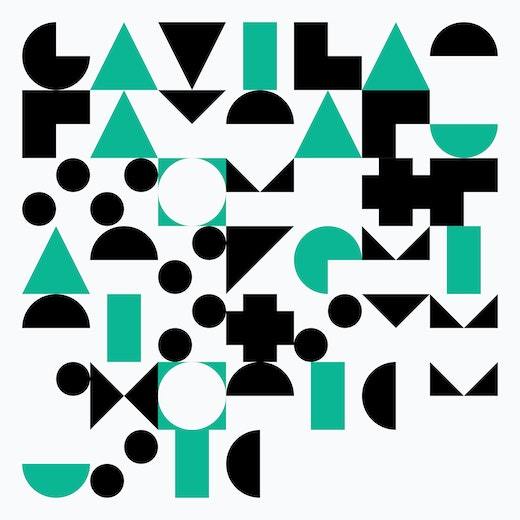
Gavilán Rayna Russom - Trans Feminist Symphonic Music

Melanie Velarde - Deep Circles

Angel Bat Dawid - Harkening Etudes

N Chambers - Itinerant Pattern
@markgowing
@formist_foundry
@formisteditions
@longformeditions
0 notes
Text
Concert review, ★★★★½, Prix Serdang 2023 for Ariel Lanyi. Award ceremony and recital @ Villa Serdang, Feldbrunnen SO, 2023-06-25 — Hugo Wolf: Italienisches Liederbuch (Italian Songbook), HWW 159 (selection, arranged for piano by Ariel Lanyi); Robert Schumann: Symphonic Etudes in C♯ minor, op.13 (including the 5 extra variations, op.posth.)
Blog post #648
#rolfsmblog#concert review#concert#serdang#prix serdang#prix serdang 2023#ariel lanyi#lanyi#villaserdang#wolf#hugo wolf#schumann#etudes symphoniques#transcription#piano#piano recital
0 notes
Text
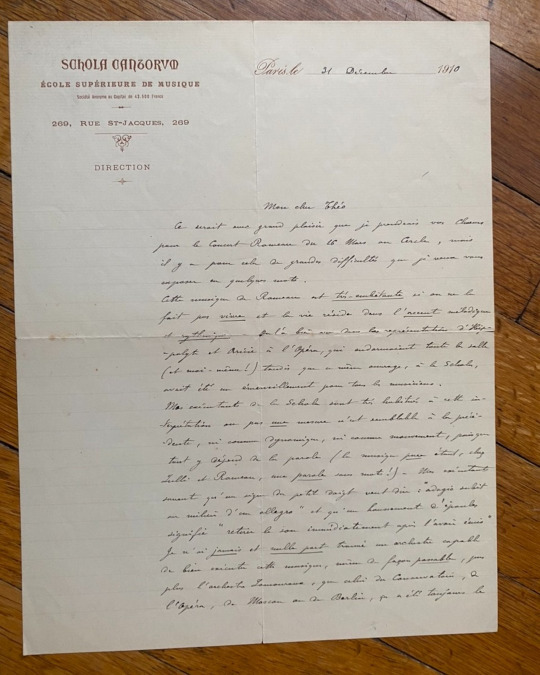
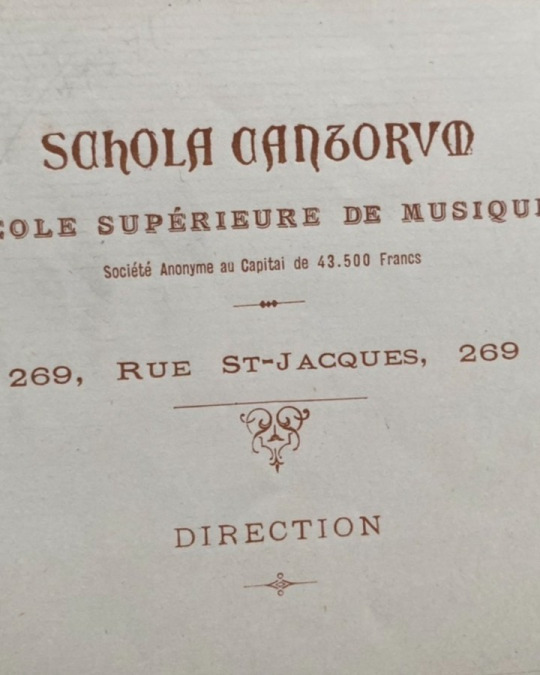
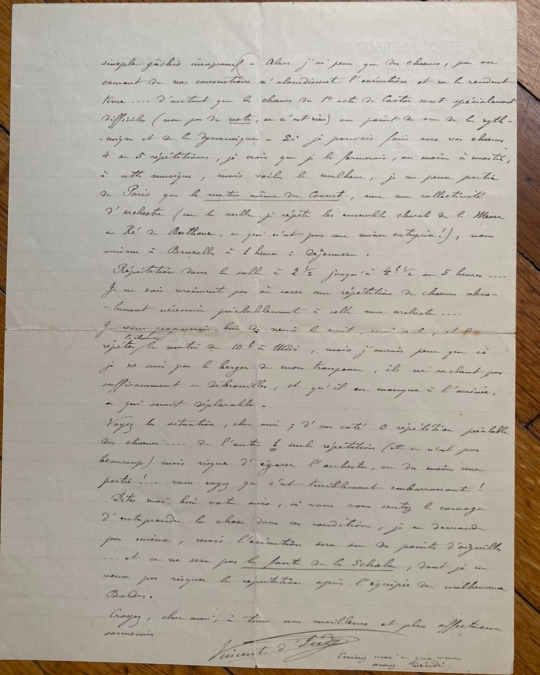
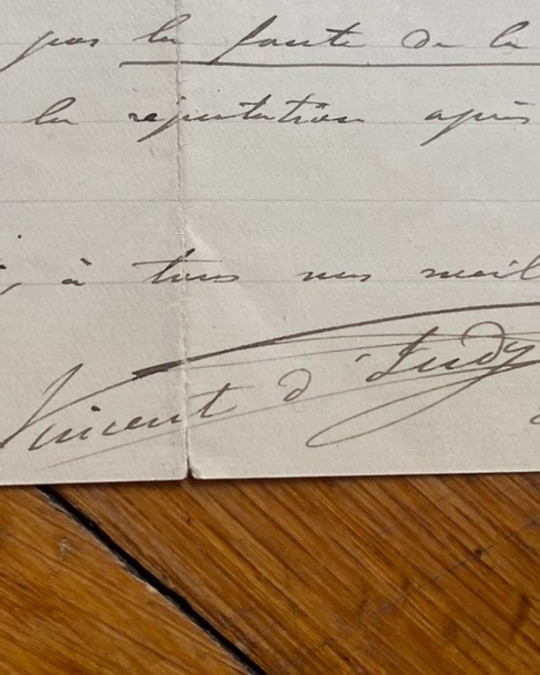
OTD in Music History: Composer and pedagogue Vincent d'Indy (1851 – 1931) died in France. As a young man, D'Indy studied under composer Cesar Franck (1822 - 1890) at the Paris Conservatoire in the 1870's; for the rest of his life, he idolized Franck as his musical ideal, and ultimately wrote a celebrated biography of his cherished mentor in 1912. But in some ways, the entire decade of the 1870's was a veritable whirlwind of artistic inspiration for D'Indy -- during the summer of 1873 he visited Germany and met with met both Franz Liszt (1811 - 1886) and Johannes Brahms (1833 - 1897), and in 1875 he played a minor role – "The Prompter" – in the world premiere of Georges Bizet's (1838 - 1875) opera "Carmen." Finally, in 1876, he attended the very first production of Richard Wagner's (1813 - 1883) "Ring cycle" at Bayreuth; this made a great impression on him, and he quickly became a fervent Wagnerian. D'Indy's influence as a teacher was considerable: In 1894, he co-founded the "Schola Cantorum de Paris" (an important private music school), and he also taught at the Paris Conservatoire. His students included Erik Satie (1866 - 1925), Albert Roussel (1869 - 1937), (1866 - 1925), Arthur Honegger (1892 - 1955), Darius Milhaud (1892 - 1974), and -- of all people -- American Broadway composer Cole Porter (1891 - 1964). As a composer, unfortunately, d'Indy has languished. Few of d'Indy's works are performed regularly in concert halls today, and the Grove Dictionary of Music observes that his famed veneration for Ludwig van Beethoven (1770 - 1827) and Franck "has unfortunately obscured the individual character of his own compositions, particularly his fine orchestral pieces descriptive of southern France." Among his best-known pieces are the "Symphony on a French Mountain Air" for piano and orchestra (1886) and "Istar" (1896), a symphonic poem in the form of a set of variations in which the theme appears only at the end... PICTURED: A 1910 autograph letter written out and signed by d'Indy on his Scholar Cantorum letterhead, addressed to an unnamed friend and regarding various musical matters.
#Vincent d'Indy#pedagogue#teacher#composer#classical composer#Schola Cantorum de Paris#Paris Conservatoire#Société nationale de musique#Symphony#symphonic poem#tone poem#Orchestra#Paris Opéra#conductor#classical music#Impressionism#music history#sonata#prelude#etude#fugue
1 note
·
View note
Text
Sibelius: pieces to listen to
In honor of Jean Sibelius' birthday (and Finland's independence day 6th Dec) I made this list of his works to listen to:
Symphony, op. 39 no. 1
Violin concerto op. 47
Tapiola, op. 112 (A symphonic poem)
Romance for violin and piano, op. 78 no. 2
The Spruce (from "The Trees") op. 75 no. 5
Etude, op. 76 no. 2
Waltz, op. 81 no. 3
Valse triste, op. 44
Finlandia, op. 26 (A symphonic poem)
Karelia suite, op. 11
Sydämeni laulu, op. 18 no. 6
81 notes
·
View notes
Video
youtube
Caplet - Le masque de la mort rouge, for harp and orchestra
13 Pieces for Halloween, no.3. André Caplet isn’t a common name nowadays. He was a turn of the century French composer who was most well known for his orchestrations of Debussy’s piano music. At the time, there were two new competing harp designs: the pedal harp [which is the standard today] and the chromatic harp [where every pitch gets its own string]. Caplet wrote this “symphonic etude” for the chromatic harp, and it also works as a tone poem based off of the Edgar Allan Poe tale The Masque of the Red Death. One of my favorite stories since I discovered it in high school. The Masque of the Red Death is about a country that is hit by a terrible plague. The Red Death causes fevers and makes the victim bleed from all pores and orifices. An aristocrat, Prince Prospero, plans to avoid the plague and invites other gentry and high society members to lock themselves away in his fabulous castle, letting the country die around them. They wait off the plague by gorging on feasts and having extravagant parties. There are several rooms, each one decorated with glass windows to give off colored lights. The gimmick is nice for all rooms except the last, where the red stained glass gives off blood light over black furniture. The party goes well, except one person has come to the masquerade dressed as a victim of the Red Death. The prince is enraged, and rushes to find out who would do something so grotesque to mock everyone. He chases the person through all of the rooms, and at the last room, the blood room, the mask falls and it’s revealed that it isn’t a person at all. The Red Death itself has entered the party, and it takes everyone’s lives. The music of Caplet’s poem recreates the darkness and drama of the story, starting with eerie harmonies and sounds, melting into a few dances for the party, that grow and develop into something frantic and disturbing. It also follows the plot’s chase scene at the end, and we come back to the beginning, as mysterious and bleak as can be.
#Caplet#le masque de la mort rouge#harp#orchestra#music#classical#Poe#Edgar Allan Poe#halloween#halloween music#classical music#orchestra music#harp music#poem#tone poem#symphonic poem#etude#symphonic etude#orchestra etude#harp etude#Caplet le masque de la mort rouge#the masque of the red death#Andre Caplet
32 notes
·
View notes
Text
Lapinha's Tombeau: Symphonic Etude No.1, Mov. Grave for 2 Oboes, 2 Bassoons, Trumpet, Clavichord, Timpani and Strings.
by @suigenerisstuff
youtube
ps. I'm proud to present this original work, there will be three movements in all, so follow for the other two!
Joaquina Maria da Conceição 'Lapinha', probably born in Minas Gerais, was a black musician who lived at the end of the 18th century and the beginning of the 19th century. She was one of the pioneering women to receive authorisation to take part in public shows in Lisbon and the first Brazilian singer to make an international career through the dissemination of the modinha genre in its inaugural adaptations for Latin America. Joaquina Lapinha's anonymity is a reminder that many first-rate black women and artists have been forgotten by history, due to ideologies that are harmful to human dignity and art. The work presented is firstly a tribute to her triumph in life, based on an interpretation of the concert music of the time and the Galante Style, which was largely influenced by elements of the Mannheim School and the Empfindsamkeit genre. . Later, in the second movement, the explosive narrative cools down and gives way to a passage of funereal interpretation, infused with tritones and apotheotic moments.
#Youtube#classical music#classical studies#fine art#classic literature#art#music#article#art critique#orchestra#mozart#symphony#classical musician#classical art#composer#beethoven#bach#piano#violin#fineart#vivaldi#baroque#musician#academics#Aesthetic#academia#classic academia#uni#literature#college
3 notes
·
View notes
Photo


🇵🇱 16 września 1800 roku w Koryciskach koło Radomia przyszedł na świat Józef Nowakowski, pianista, kompozytor i pedagog, bliski przyjaciel Fryderyka Chopina. Początkowo uczył się gry na puzonie, rogu i fortepianie w klasztorze cystersów w Wąchocku. W latach 1821-1826 był studentem Konserwatorium Warszawskiego, gdzie uczył się kompozycji u Józefa Elsnera i gry na fortepianie u Wilhelma Würfela. Tam też zaprzyjaźnił się z Chopinem. Przyjaźń tych kompozytorów trwała długie lata. W 1833 roku Nowakowski podróżował po Niemczech, Włoszech i Francji. Kilkakrotnie (1838, 1841, 1846-47) przebywał w Paryżu, gdzie z pomocą Chopina, wydał zadedykowane mu etiudy. W 1836 roku razem z Chopinem złożył wizytę Robertowi Schumannowi w Lipsku. Komponował głównie muzykę fortepianową oraz pieśni, muzykę kameralną i symfoniczną. Napisał też podręcznik do gry na fortepianie. Pod koniec życia był sparaliżowany. Zmarł w 1865 roku w Warszawie.
🇬🇧 Józef Nowakowski, pianist, composer and teacher, was born on 16 September 1800 in Koryciska, near Radom. He was Fryderyk Chopin’s close friend. As a young man, he studied trombone, horn and piano playing in the cistercian abbey in Wąchock. From 1821 to 1826, he studied in Warsaw Conservatory: composition with Józef Elsner and piano playing with Wilhelm Würfel. There he became friends with Fryderyk Chopin. In 1833, Nowakowski travelled across the Germany, Italy and France. He visited Paris for several times (1838, 1841, 1846-47). There (with Chopin’s help) he published his set of piano etudes, dedicated to Chopin. In 1836, he and Chopin visited Robert Schumann in Leipzig. He wrote mainly piano music, and also songs, chamber and symphonic music. He wrote popular book about piano playing. He suffered from paralysis at the end of his life and died in Warsaw in 1865.
#józef nowakowski#fryderyk chopin#on this day#poland#polish music#classical music#romanticism#romantic era#wilhelm würfel#polska#polish#polish composers#romantyzm#piano#1840s#1860s#1830s#1820s
32 notes
·
View notes
Text
Scriabin
By Alexander Scriabin (1871-1915) Russian, I have stand alone double cd sets: Piano Sonatas 1 2, Symphonies 1 2; lp to 4 cds transfers of solo piano music that includes mazurkas, etudes etc. As mp3: symphonic poems: Prométhée, Le Poème du feu; Le Poème de l’extase; Piano Concerto. The lp transfer were of a VoxBox 3 lps set. Much of this is influenced by Chopin & delights, if you like Chopin.…
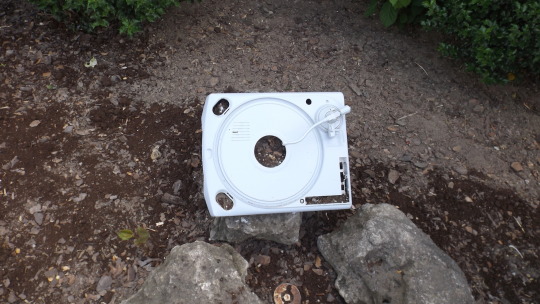
View On WordPress
#Alexander Scriabin#am writing#classical#Le Poème de l’extase#Le Poème du feu#light show#music#Ontario#photographs#piano#Prométhée#review#Russia#Russian#synesthesia#Toronto
5 notes
·
View notes
Video
youtube
(via Robert Schumann - Symphonic Etudes, Op. 13 - YouTube)
i think this is the first time i’ve ever heard his symphonic etudes all the way through [never been a huge schumann fan] and... wow.
I especially love the last supplemental variation and the finale.
11 notes
·
View notes
Video
youtube
Charles Amirkhanian - Loudspeakers - a new collection of his “sound landscapes” as opposed to his “text-sound” pieces (New World Records)
Charles Amirkhanian (b. 1945) can be regarded as a central figure in American music, and on several fronts. As a composer, he's been pervasively innovative in two genres: text-sound pieces, in which he can draw engaging rhythmic processes from wacky word assemblages such as "rainbow chug bandit" and "church car rubber baby buggy bumper"; and natural-sound electronic pieces which go far beyond the usual confines of musique concrète to create long, poetic sound narratives poised between collage and sonic landscape.
Amirkhanian's text-sound pieces often begin with a quasi-minimalist basis in repetition, but their processes are playful and even humorous rather than strict. His electronic landscapes (including all the ones here) occasionally include repetitive elements, but are more poetic, intuitive in their form and often impressionistic in their effect. Several of his earlier commercial recordings have showcased the text-sound pieces; the present two-disc set is a welcome compendium of his sound landscapes. We might characterize the whole as three tone poems preceded by a set of ten etudes.
The set of ten pieces, Pianola (Pas de mains) (1997 - 2000) - the subtitle is French for "no hands") - stems from Amirkhanian's long fascination with the player piano, or pianola - the self-playing piano, and is a whimsical set of essays based on the sound and techniques of the player piano.
The remaining three works [Im Frühling (1989 - 90), Son of Metropolis San Francisco (1997), Loudspeakers (for Morton Feldman)(1988 - 90)] might be characterized as extended love poems, so affectionately do they portray their respective subjects: spring, San Francisco, and the composer Morton Feldman. These pieces were composed using the Synclavier, an electronic sampling keyboard first developed at Dartmouth in the late 1970s, for which Amirkhanian has written many of the most ambitious works.
What links all these pieces is a creative ambiguity of genre, a delight in shifting back and forth between elements whose sources can be recognized and those whose can't. The pacing, at least in the latter three works, is leisurely, and somewhere between ambient and symphonic: One can listen to them as atmosphere, yet a sense of overall dramatic shaping is not absent. Though we listen to them through loudspeakers, it seems problematic to pigeonhole Amirkhanian as an "electronic" composer. The music, restful and noisy at once, is too playful for that, and too natural - and elicits a listening mode that brings no other composer to mind.
youtube
#Charles Amirkhanian#loudspeakers#experimental#modern classical#New World Records#synclavier#electronic#2020
5 notes
·
View notes
Audio
All the while churning out rock and roll hits, Elton made instrumental opuses such as this symphonic etude like it’s nobody’s business and i'm
#how have i not known for 30 some years that he has been a genius this level#elton john#music#this is followed by a fanfare which is equally fabulous#arranged for symphony by James Newton Howard
1 note
·
View note